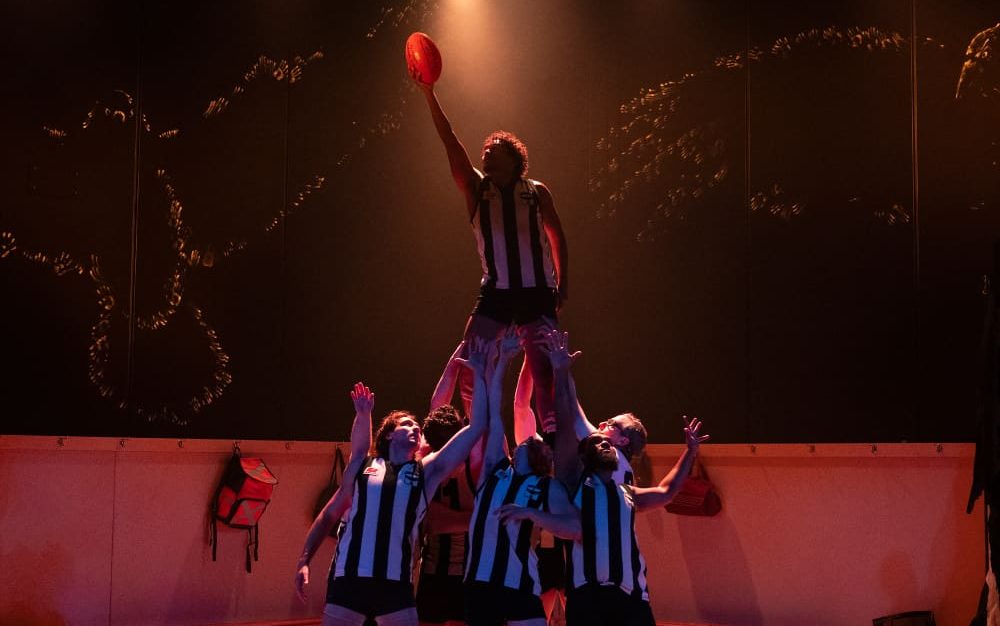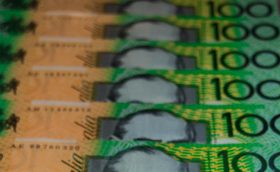AFL player Adam Goodes’ confrontation with a 13-year-old girl who called him an ape during a footy match in 2013, and the ensuing booing saga, sparked a national conversation about racism that loomed large in our cultural identity.
On the day this writer went to see 37, the Melbourne Theatre Company’s new work – commissioned through its Next Stage program and based on this infamous incident (37 was the number of Goodes’ jersey) – as a nation we were at it again.
This week, it was sparked by Matildas’ star striker Sam Kerr and what she allegedly called a London policeman. Whether you’re knee-deep in the comments section of a social media post or engaged in some political parlay in a pub, you will have been aware of some of the most divisive back-and-forth emerging in this new cultural reckoning. You’ll hear it again as part of the locker-room chat in 37, as players of the community football team, the Currawongs, rub up against each other in the wake of the Goodes saga.
Trawlwoolway man, Nathan Maynard, has written something pretty special here and, in the hands of Isaac Drandic (Noongar) as director, and his ensemble of talented actors, it is just such good theatre: bold, shocking, important, accessible. It also wields that most wonderful of wily weapons – humour – with precision.
Even for non-AFL fans, it’s a relief to discover that 37 stands on its own. As David Mamet wrote in his punchy thesis Three Uses of the Knife: On the Nature and Purpose of Drama, a tense sporting match is a great metaphor for a perfect three-act structure. And, in 37, the recruitment of star footy players the Marngrook cousins Sonny (Tibian Wyles) and Jayma (Ngali Shaw) to an all-white community football team hell-bent on winning their first premiership since the club formed some decades before, the drama is ripe from the start.
Marngrook comes from the name of the traditional First Peoples sport that preceded AFL. We learn from Shaw early on, as he directly addresses the audience in the play’s only monologue, that in what we now know as Victoria, the game was traditionally played by First Peoples with a ball made of possum skin.
In the next scene we’re introduced to Sonny and Jayma as the narrative begins. Sonny doesn’t want to join the team of “white fellas”, but Jayma convinces him as he senses he’ll be the odd one out otherwise, and wants a friendly face close by. Joining the community team leads to a culture clash, as the existing players confront their own stereotypical or theoretical views of what “Aboriginals” are like. Various views are represented, from the ignorant ‘aren’t all Aboriginal people related?’ to the downright racist, as the personalities jostle against each other.
There’s a suitably juvenile initiation ceremony involving a bull’s rear foisted upon Jayma and Sonny as the team’s newbies, but it’s in these ensemble scenes that the play shines. Each character is clearly defined bouncing off each other, talking smack or lifted into the air as part of the stunning physical sequences that are more like a football ballet – the chemistry is electric.
It’s in these choreographed sequences (by Waangenga Blanco and Isaac Drandic) where the lighting (Ben Hughes) and sound (by James Henry) and set design (Dale Ferguson) also come into their own – helping to physically draw the connections between Marngrook and AFL with dance and sounds evocative of traditional ceremony, as well as to help slow time and spotlight key moments of drama in the team’s football matches, as the dust that forms the entire stage is kicked up by the movement of the players.
Key to 37 is the pressure-cooker culture of the team itself, led by “The General” (Syd Brisbane), which acts as a microcosm of Australian society and all the different people with varied backgrounds and views contained within it.
When the team watch Goodes play on TV while sinking beers at the pub, it leads to the seed of a conflict between Jayma and Woodsy, who is from a seventh-generation local farming family, which is also the major sponsor of the Currawongs. Woodsy is the most objectively racist voice within the footy team and, later, there’s a line he comes out with during a particularly tense scene that sends shockwaves through the group.
It’s here where the play – for all its banter and ball ballet – gets to the sticky substance of its disembowelling of our culture. It’s here where we discover the harsh reality of how power works: innoculating the powerful against moral culpability, protecting its own, preserving the status quo at all costs.
There is so much to talk about and discuss in this play, and it feels just so vitally relevant to us as a nation – as we come off the back of what the “No” vote on a constitutionally enshrined Voice to Parliament means, as we in Victoria continue our journey to Treaty, as people on the trains and buses around the nation discuss whether Sam Kerr was being racist.
And for all the meat on the bones of this play, it is a truly funny, wildly entertaining piece of ensemble theatre, with a cast simply oozing charisma (Ngali Shaw just continues to shine, after his star turn in Jacky) and with a proper sting in its tail that reminds us that every game we play in life – in politics, in society, in relationships – is a choice. No matter how much we think there isn’t one to be made. And that is where true power lies.
Read: Exhibition review: Joy, Immigration Museum
In a nutshell: perfect theatre. Get yourself a ticket – you won’t want to miss being a part of the discussion.
37 by Nathan Maynard
Director and co-Choreographer: Isaac Drandic
Set and Costume Designer: Dale Ferguson
Lighting Designer: Ben Hughes
Composer and Sound Designer: James Henry
co-Choreographer: Waangenga Blanco
Voice and Text Coach: Matt Furlani
Assistant Director: Kamarra Bell-Wykes
Fight Choreographer: Lyndall Grant
Intimacy Coordinator: Isabella Vadiveloo
Cast: Syd Brisbane, Mitchell Brotz, Samuel Buckley, Costa D’Angelo, Thomas Larkin, Eddie Orton, Ben O’Toole, Ngali Shaw, Anthony Standish, Tibian Wyles
37 will be performed until 5 April.





